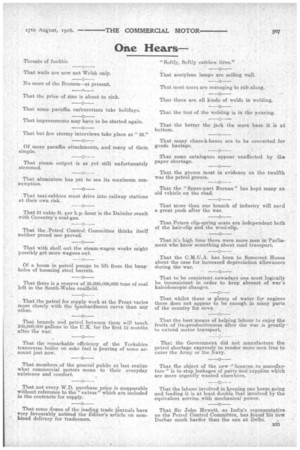One Hears
Page 5

If you've noticed an error in this article please click here to report it so we can fix it.
Threats of fuelitis That wails are now not Welsh only.
No more of the Bremen—at present.
That the price of zinc is about to sink.
That some paraffin carburetters take holidays.
That impressments may have to be started again.
That but few stormy interviews take place at 2.2.” Of more paraffin attachments, and many of them simple.
That steam output is as yet still unfortunately stemmed.
That aluminium has yet to see its maximum consumption.
That taxi-cabbies must drive into railway stations at their own risk, That 21 cubic ft. per h.p.-hour is the Daimler result with Coventry's coal-gas.
That the .Petrol Control Committee thinks itself neither proud nor proved.
That with shell out the steam-wagon works might possibly get more wagons out.
Of a boom in petrol pumps to lift from the bungholes of booming steel barrels.
That there is a, reserve of 35,690,000,000 tons of coal left in the South-Wales coalfield.
That the petrol for supply work at the Front varies more closely with the hyrabardinent curve than any other.
31)0,006,000 gallons in the U.K. for the first 12.months That benzole and petrol between them will touch ‘. after the war: That the remarkable efficiency of the Yorkshire transverse boiler on coke fuel is firoving of some account just now.
That members of the general public at last realize what commercial motors mean to their everyday existence and comfort.
That not every W.D. purchase price is comparable without reference to the "extras" which are included in the contracts for supply.
That some dozen of the leading trade jhrnals have very favourably noticed the Editor's article on combined delivery for tradesmen. "Softly, Softly catchee tiree."
That acetylene lamps are selling well.
That most users are managing to rub along.
That there are all kinds of welds in welding.
That the test of the welding is in the Tearing.
That the better the jack the more base it is at bottom.
That many chars-h-bancs are to be converted for goods haulage.
That some catalogues appear unaffected by the paper shortage.
That the grouse most in evidence on the twelfth was the petrol grouse.
That the "Spare-part Bureau" has kept many an old vehicle on the road.
That more than one branch of industry will need a great push after the war.
That Peters clip-spring seats are independent both of the hair-clip and the wool-clip.
That high time there were more men in Parlia ment who know something about road transport.
That the C.M.U.A. has been to Somerset House about the case for increased depreciation allowances during the war.
That to be consistent nowadays one must logically be inconsistent in order to keep abreast of war's kaleidoscopic changes.
That whilst there is plenty of water for engines there does not appear to be enough in many parts of the country for cows.
That the best means of helping labour to enjoy the fruits of its4productiveness after the war is greatly to extend motor transport.
That the Government did not manufacture the petrol shortage expressly to render more men free to enter the Army or the Navy.
That The object of the new "licences to manufacture" is to stop leakages of parts and supplies which are more urgently wanted elsewhere.
That the labour involved in keeping one horse going and feeding it is at least double that involved by the equivalent service with mechanical power.
That Sir John Hewett, -as India's representative on the Petrol Control Committee, has found his new Durbar much harder than the one at Delhi.




















